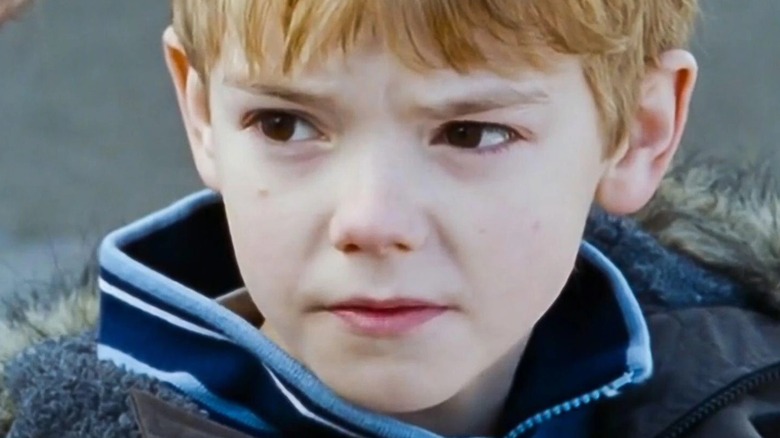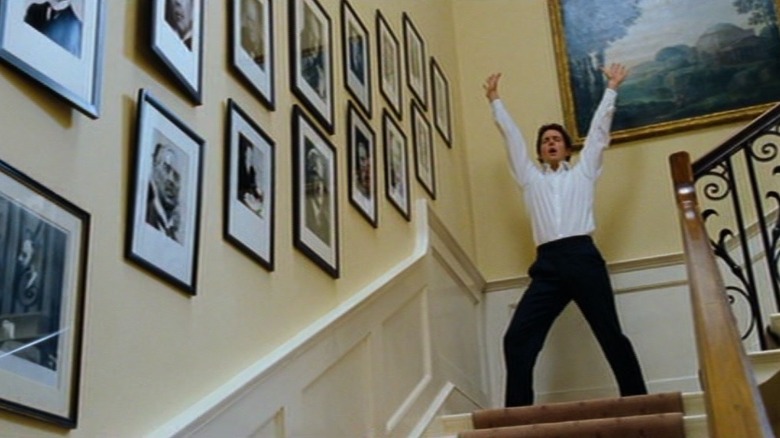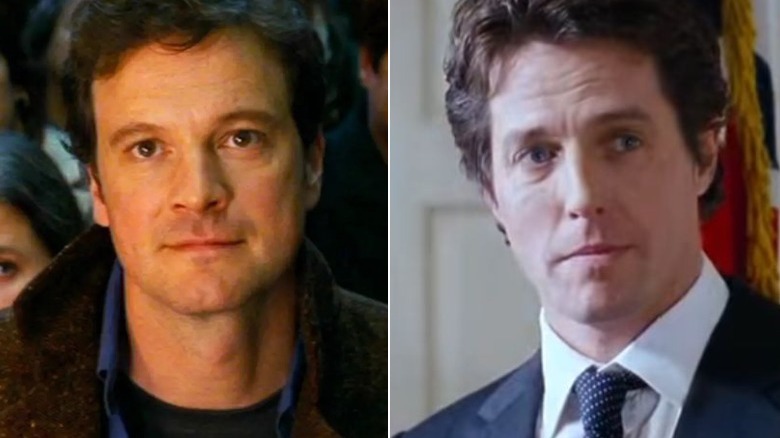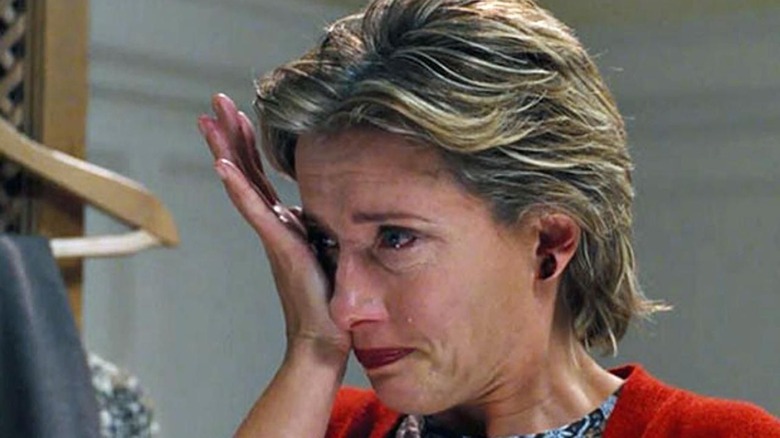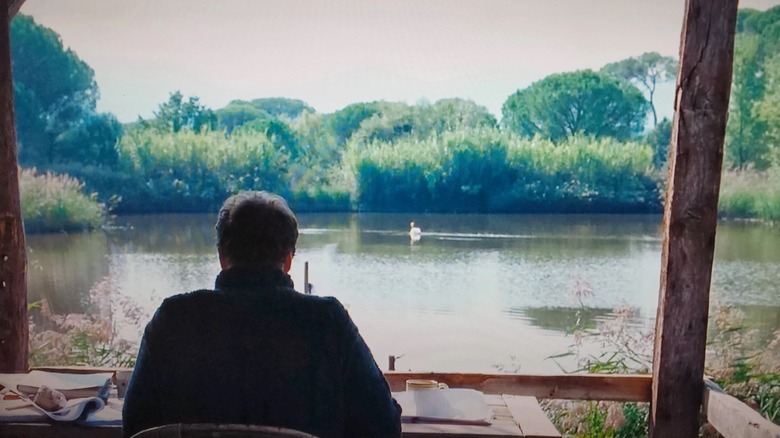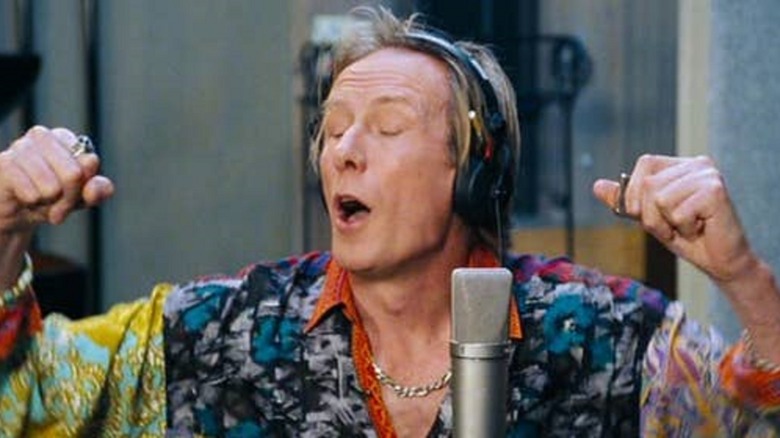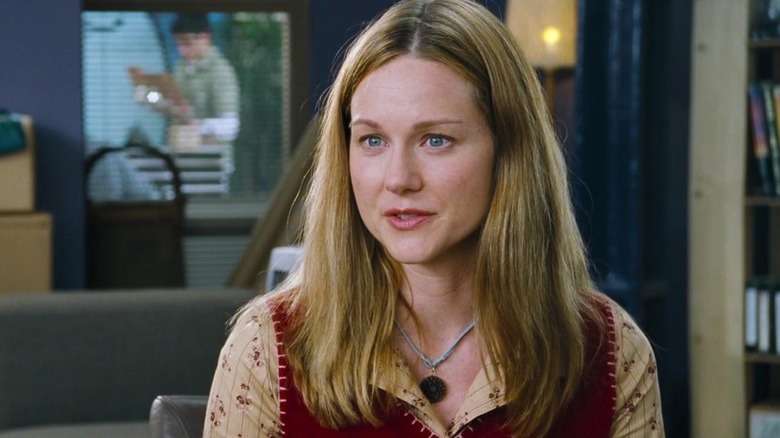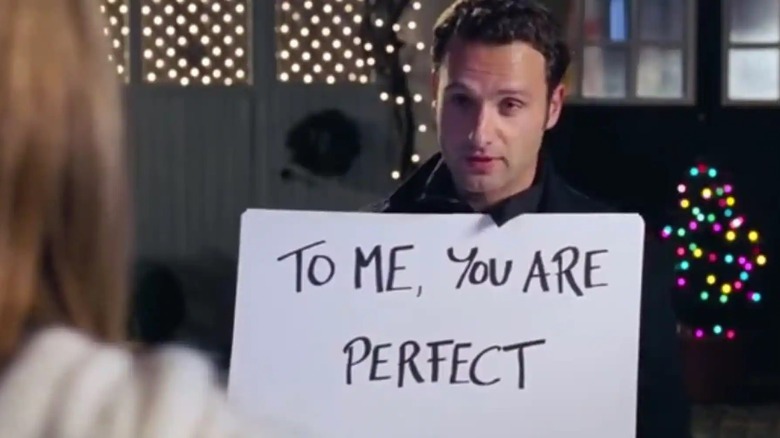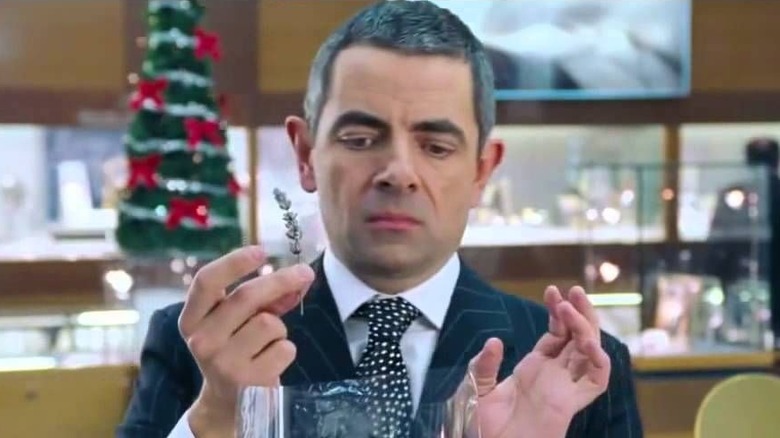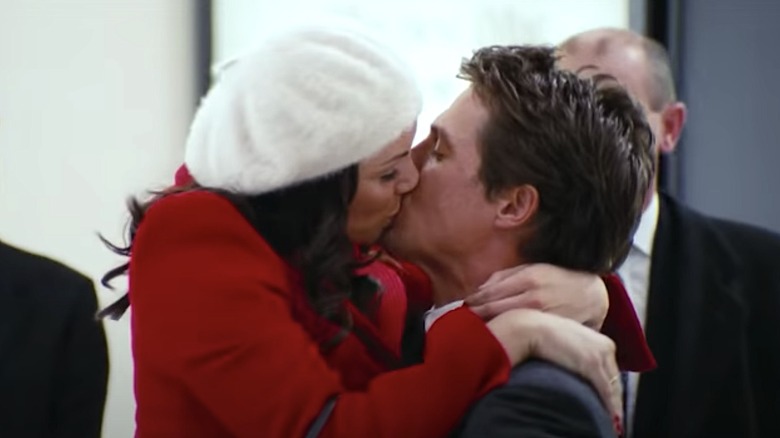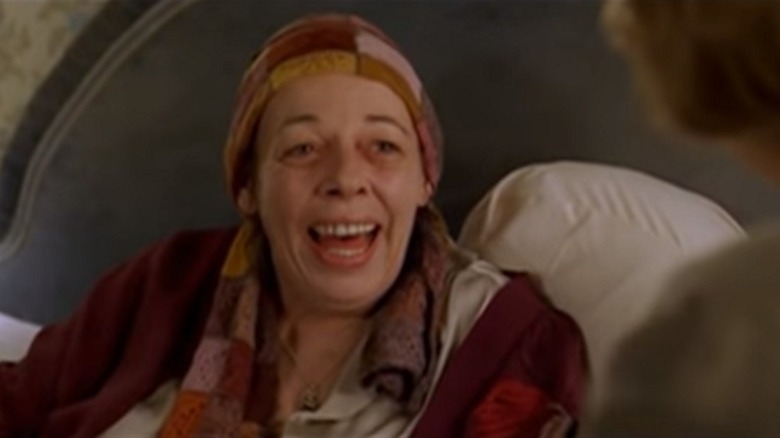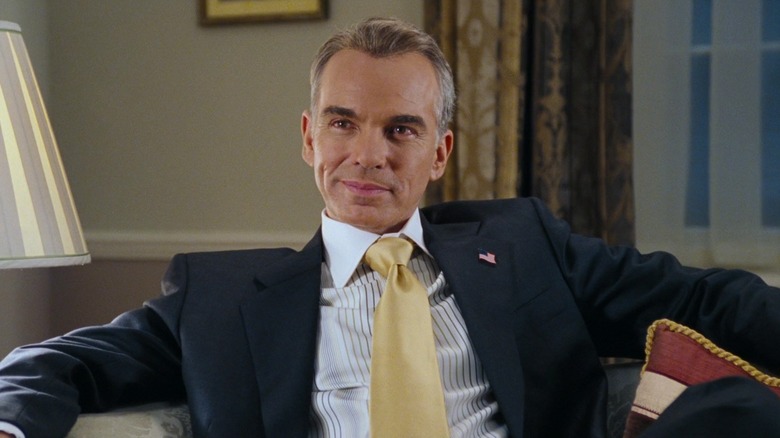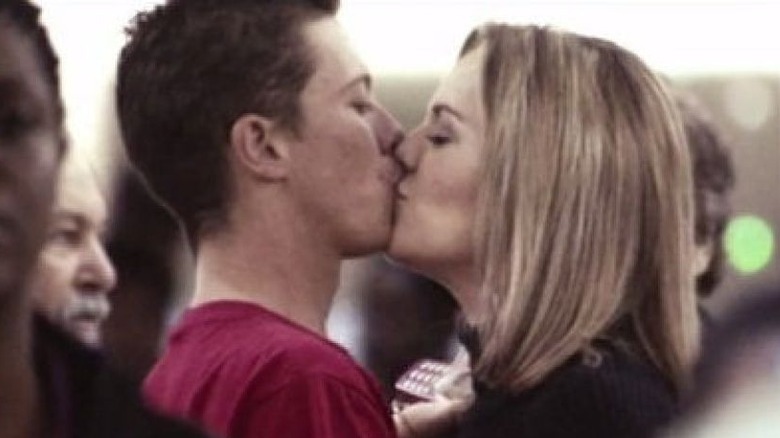The Untold Truth Of Love Actually
Would you rather open one big present on Christmas Day, or lots of little presents? If you chose the second option, and you're someone who refers to December as "Christmas movie month," you've probably seen "Love Actually."
Inspired by that well-known romantic comedy "Pulp Fiction," plus some Woody Allen and Robert Altman, writer and director Richard Curtis decided to, as he later told Entertainment Weekly, "do the 30 best scenes from ten movies instead of one movie with three good scenes."
That's a bit of false modesty, given that by 2003, when "Love Actually" was released, Curtis was already Britain's most famous rom-com director of his era. He'd earned a Best Original Screenplay Oscar nomination for "Four Weddings and a Funeral" in 1995, which he followed with two more hits: "Bridget Jones's Diary" and "Notting Hill."
However, Curtis' fame was eclipsed by that of his impressive ensemble cast. As Andrew Lincoln later told The Daily Beast, "It was the most ridiculously glamorous queue for the make-up chair I have ever seen." Lincoln was one of several cast members who were unknown before "Love Actually" and became very famous later. But stars like Colin Firth, Hugh Grant, Emma Thompson, Alan Rickman, and Laura Linney were already A-listers.
With so many superstars to please, you might expect backstage tantrums and theatrics. And, yes, Hugh Grant did get very grumpy about one scene in particular. But most of the untold truths of "Love Actually" will make you want to go back and enjoy it again.
Hugh Grant was bah humbug about that dancing scene
The moment in which the rhythm gets its clutches on Hugh Grant's Prime Minister is supposed to be a spontaneous celebration. However, flagrantly disobeying the lyrics of the Pointer Sisters' song playing in the background, Grant was not jumping for joy. He refused to rehearse until the last possible minute, although Richard Curtis says that Grant did come to set on the day with a few jokes to throw in (via Radio Times). Grant, however, has admitted no such thing.
The crux of the disagreement, at least according to Curtis, was that Grant had been consistently worried about his prime minister coming across as a joke. The dance was the climax of those concerns, "because there was no way he could do that in a prime ministerial manner," Curtis told The Daily Beast.
Grant maintains that he hated shooting the scene — "stone cold sober" at 7 a.m., as he put it in a BBC Two documentary about Grant's career (via Radio Times). But Curtis hints otherwise.
"[He] turned out, from his dirty behavior in discos across London, to be quite good at dancing," Curtis said in the documentary. He also told the Daily Beast that Grant got so into the shoot that he started mouthing the words to the song they originally used, by the Jackson 5, which they couldn't ultimately get the rights to. They were forced to cut around those takes, but fortunately Grant's moves were good enough to carry the scene, despite his best efforts.
Two of the Love Actually stories were supposed to be standalone movies
One of the unique selling points of "Love Actually" as a holiday classic is that it features multiple mini love stories — like a romantic advent calendar. But Richard Curtis originally planned to make two of them into full-length feature movies.
He told The Daily Beast that by 2003, he was in the rom-com groove thanks to the success of 1994's "Four Weddings and a Funeral," 1999's "Notting Hill," and 2001's "Bridget Jones's Diary." He started coming up with outlines for more love stories, including one about an unlucky-in-love writer who moves to France for peace and quiet and accidentally falls in love — yes, the Colin Firth story. Another was about a prime minister whose political aspirations are somewhat sidetracked when he falls in love, which became the Hugh Grant story.
That second story was inspired by a real PM. Curtis explained that between 1970 and 1974, Britain was led by Prime Minister Ted Heath, a bachelor. Aware of the distracting nature of love, Curtis told The Daily Beast, "I always thought, 'What would have happened had he fallen in love with someone? It would be so weird that this person would be meant to be running the country, but he'd actually spent it falling in love.'" Curtis got to watch that for real: In 2021, Prime Minister Boris Johnson married his second wife Carrie Symonds while in office.
Emma Thompson drew on her real-life heartbreak for that emotional scene
Despite being a Christmas movie, "Love Actually" isn't all merry and bright. One of the most devastating moments has Karen (Emma Thompson) slipping off to cry alone in her room, having just discovered that her husband Harry (Alan Rickman) has given a gold necklace to another woman.
The scene resonated strongly with audiences, and with Thompson herself. In 2018, she said that in the moment, she drew on her breakup with fellow British actor Kenneth Branagh (via The Telegraph). The couple had married in 1989, but in 1994 Branagh had an affair with Helena Bonham Carter (another British thesp), and he and Thompson divorced.
Thompson said that although her relationship didn't play out exactly like Karen's, "I had my heart very badly broken by Ken. So I knew what it was like to find the necklace that wasn't meant for me."
One of the many people in awe of Thompson's performance in that scene is director Richard Curtis, who got to watch it firsthand. They shot it nine times from various different angles, "and she did it perfectly all nine times," he told Entertainment Weekly.
Thompson, Branagh, and Bonham Carter all later appeared in the "Harry Potter" series, as Professor Trelawney, Gilderoy Lockhart, and Bellatrix Lestrange respectively. Thompson has since remarried, and has "made peace" with Bonham Carter.
The pond (probably) didn't have eels but it still wasn't fun
If "Love Actually" taught us anything, it's if you must type your novel on a typewriter, outside, by a pond, then you should make copies so you and your housekeeper don't have to dive into said pond when a gust of wind scatters your first draft.
Like his character Jamie, Colin Firth was not a fan of being in that pond. For starters, it was only about 3 feet deep, which meant Firth and Lúcia Moniz, who played Jamie's love interest Aurelia, had to sit on the bottom to appear submerged. "But my bum kept floating up," Firth told Entertainment Weekly. As to how Moniz — or a stunt double — pulled off that dive into the water, he's not clear.
Issues of depth, or lack thereof, aside, the state of the water was also somewhat murky. "No sensible person would have gone in that water," Firth admitted. The eels may have been fictional, but something bit Firth on the arm, resulting in a swelling on his elbow that needed medical attention.
Firth should have known "Love Actually" would involve water of some kind. In his breakout role in the BBC's adaptation of "Pride and Prejudice," Firth famously emerged — fully clothed — from a lake, and became an instant heartthrob. On the "Love Actually" DVD commentary, Curtis said that ever since then, he's been finding excuses to get Firth in a wet shirt in his movies.
Bill Nighy was naked under that guitar
Originally, Richard Curtis had an actual rock star in mind to play lovably wild musician Billy Mack, although he won't say who. An unnamed comedian was also in the running. However, when he finally agreed to see Bill Nighy audition, he knew instantly he'd found the right man.
Nighy didn't even know he was auditioning: He thought he was just doing a read-through. Nevertheless, Billy was a dream role for the rockstar-obsessed actor. He'd been in a band as a kid, and loved to read music magazines. "I used to be able to tell you the bass player in every band on earth. And the second drummer," he told Entertainment Weekly.
Knowing all that history likely made recording the character's song at Abbey Road studios even more daunting, but at least he had lots of inspiration to draw on. Nighy told the Guardian he based the character on several of his musical heroes. Like Curtis, he's not naming names, but looking at Billy, could one of them rhyme with Wreath Kichards?
Billy's most rock 'n' roll moment was almost too racy. Nighy really did get naked — aside from a pair of cowboy boots — for that video. He was so into it that a producer had to keep reminding him to lower the guitar, lest his Jingle Bells make a cameo.
Richard Curtis convinced Laura Linney to sign on in a letter
If you have a hard time picturing anyone but Laura Linney playing lovelorn nonprofit worker Sarah, know that Richard Curtis was in the same camp before she was even cast.
Curtis originally wanted a British actress for the role, but she had to also remind people of Laura Linney. Eventually, Curtis' business and romantic partner Emma Freud told him to try to get the real Laura Linney.
Curtis drew on his writing skills, sending Linney a physical letter in which he explained all this and asked her to join the cast. She did, as we know, and later described making the movie as "a magical experience from beginning to end" to The Daily Beast.
During filming, Linney was going through a breakup. So was Rodrigo Santoro, who played her onscreen love interest Karl. Their shared experience brought them closer together. "We both got to make each other feel better all day long," Linney later told Entertainment Weekly. She also said she and Santoro had the best kiss of the movie — and he returned the compliment.
Andrew Lincoln worried his character seemed stalkerish
Criticizing "Love Actually" has become a holiday tradition for some internet users. The scene that typically comes under the most scrutiny involves Andrew Lincoln's character Mark using handwritten signs to swear his undying love to his best friend Peter's (Chiwetel Ejiofor) new wife Juliet (Keira Knightley).
While the form of communication is charming, the fact that he's sneaking behind Peter's back and coercing Juliet — whom he's barely spoken to — into lying to her husband is not going to get him on Santa's nice list.
It took about a decade for audiences to really turn on the movie, but Lincoln was worried about this scene from the start. Or so he told Entertainment Weekly in 2017: "I kept saying to Richard, 'Are you sure I'm not going to come off as a creepy stalker?'"
Curtis had no such concern: He had faith that Lincoln could pull off possibly the most unlikeable move any protagonist has ever made in a Christmas movie. He told EW, "Andrew was so openhearted and guileless, we knew we'd get away with it." Even in 2019, Curtis stood firm. Asked what, if anything, he'd change about the movie, he replied not-entirely-seriously, "I think the naked people should be wearing more clothes" (via NME).
However, Lincoln isn't the only actor with concerns about their part in the film. Nighy told the Guardian that he "felt bad" about Billy Mack's joke about having sex with Britney Spears.
The final cut of Love Actually was missing an angel
Christmas is a magical time of year, and the original cut of "Love Actually" took that sentiment much more literally.
Legendary British comedian Rowan Atkinson — best known for the TV series "Mr Bean" and "Blackadder" — only has two scenes in "Love Actually." He's the overly enthusiastic store clerk who gift-wraps Harry's (Alan Rickman) marriage-wrecking gold necklace to within an inch of its life. And he distracts the Ringo Starr-lookalike airport guard so that Sam (Thomas Brodie-Sangster) can sneak past Heathrow's extremely meticulous security protocols to say goodbye to Joanna (Olivia Olson).
In the final version of the movie, it's unclear why Atkinson's character (whose official name is Rufus, by the way) takes the time to help Sam, besides plain old festive goodwill. But both director Richard Curtis and his creative and romantic partner Emma Freud, who is credited as the script editor, have explained that originally, Rufus was supposed to be a Christmas guardian angel.
At the Montclair Film Festival 2016, Curtis compared the character to Clarence (Henry Travers) in "It's a Wonderful Life." On the DVD commentary, Curtis said that there was going to be a shot that showed Rufus slowly disappearing as he walked across the terminal.
Rufus wasn't just the world's most dedicated gift-wrapper: He was trying to prevent Harry from buying the necklace and destroying his marriage.
Martine McCutcheon had a crush on Hugh Grant
By "Love Actually," Hugh Grant had — somewhat reluctantly — cemented his reputation as one of Britain's two rom-com kings, alongside co-star Colin Firth. Meanwhile, Martine McCutcheon, who played his love interest, was best known for her role in soap opera "EastEnders," and as an up-and-coming pop singer.
The uneven dynamic between the two actors reflected that of their characters. And like much of the rom-com-loving public, McCutcheon was somewhat smitten by her co-star. She told Entertainment Weekly that she'd been "in love" with Grant ever since she'd seen him in "Four Weddings and a Funeral" when she was a teenager. To be clear, she means a crush: not showing up at his door with note cards.
McCutcheon has admitted that she felt somewhat overwhelmed by the thought of acting opposite Grant and the rest of the famous cast. Before the first rehearsal, she called Curtis and told him she was worried that she wouldn't be able "to hold my own" against these well-known actors (via the Independent). It was at that point that Curtis revealed that he'd written the part of Natalie just for her: He'd even named the character "Martine" in the script.
Although Grant doesn't have the best track record when it comes to relationships with his leading ladies, he and McCutcheon apparently got on well. In 2017, she told TV show "Loose Women" that they still text.
A poignant love story was edited out of the movie
The rom-com creating machine that is Richard Curtis' brain was in overdrive when he wrote "Love Actually." On top of the nine main storylines, there was another that didn't make it out of the editing room, much to some fans' disappointment.
It starts — strangely — with Karen's (Emma Thompson) and Harry's (Alan Rickman) son Bernie (William Wadham) being admonished by his headmistress (Anne Reid) for writing an essay about farts. Karen is called into school but sides with Bernie.
Later, the headmistress goes home and tells her partner Geraldine (Frances de la Tour) about the essay. (The exact status of their relationship is unclear, but civil partnerships for same-sex couples were introduced in the UK in 2004, a year after "Love Actually" was released, and same-sex marriages were legally allowed in England and Wales from March 2014.) Geraldine, who is dying of an undisclosed illness, laughs and teases her for being pompous. The two are later shown cuddled up in bed, as Geraldine coughs violently. It's then revealed that she has died. Curtis explained that he cut the part about Bernie's essay for time, which meant he also had to cut the Geraldine section.
On a less sad note, another deleted scene explained a shot that may have confused eagle-eyed viewers: Why is Mark dancing at the nonprofit's Christmas party? It turns out that he is the friend whose gallery Mia (Heike Makatsch) recommended to Harry.
Love Actually was a horror movie for Billy Bob Thornton
Billy Bob Thornton was not filled with festive goodwill by his experience on "Love Actually." The actor played the cool American president opposite Hugh Grant's charmingly bumbling British prime minister. This meant being on sets designed to look like the real prime minister's residence and office, Number 10 Downing Street. Given the history of the building, that meant a lot of antique furniture (or replicas, at least). Unfortunately, Thornton has a phobia of antiques.
In 2012, he explained to the New York Times that it's only pieces from certain places and eras. And he's okay with chairs. What he doesn't like, he said, are, "old dusty heavy drapes and big tables with lions' heads carved in it. Stuff that kings were around." The nature of a constitutional monarchy being what it is, "stuff that kings were around" broadly sums up British antiques.
Knowing about Thornton's phobia, Hugh Grant found every opportunity to wind him up. Martine McCutcheon told Entertainment Weekly, "Hugh was constantly pointing at pieces that were 500 years old."
Thornton had another very specific phobia that came up during shooting. According to Richard Curtis, he was wary of former Prime Minister Benjamin Disraeli's facial hair, which was on prominent display in at least one portrait. "I told him, 'Bad news, Billy Bob,'" Curtis told EW.
The airport scenes showed real love stories
"Love Actually" starts and ends with scenes of people reuniting at airports. The finale begins with the main characters returning from various places: That section was filmed in Pinewood studios, outside London. The scene then transitions into footage of real people that was shot with secret cameras at London's Heathrow airport.
In DVD commentary, Richard Curtis explained that the filmmakers spent a week using hidden cameras to capture genuine, heartfelt reunions between members of the public. Watching the footage live, if they saw something they thought would make a good moment, runners had to find the people, and get them to sign a release so it could be used in the movie.
Curtis has said that this is his favorite part of "Love Actually." And not only did he not write any of those stories, he didn't even edit the footage. As he told Entertainment Weekly, it was Emma Freud who compiled all those short clips.
One part that proved controversial was the mention of 9/11. Curtis described it to EW in 2017 as "the usual sensitivity and delicacy, which I obviously didn't agree with." Although it seems like an odd reference now, the movie was made the year after the attacks, and the sense of loss was still very sharp. Laura Linney recalled the crew holding a moment's silence in memorial. It made the need to put the spotlight on love all that more important.
